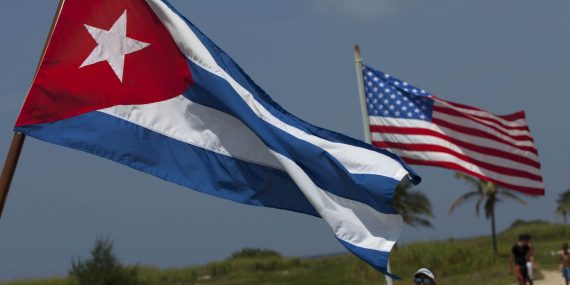It’s Time To End The Cuba Travel Ban
It's easier for an American citizen to go to Iran or North Korea than it is for them to go to Cuba, That's insane.
The New York Times Editorial Board has called for the complete lifting of the ban on American travel to Cuba:
Granted, Khartoum, Tehran, Damascus and Pyongyang are not terribly popular tourist destinations. But they are places Americans can visit without running afoul of federal law. Yet, traveling to Cuba for tourism continues to be banned. Getting there for approved purposes remains needlessly difficult and expensive.
The ban — the only travel prohibition American citizens are currently subjected to — never made sense, and it’s particularly misguided in an era of broadening engagement between the United States and Cuba.
A bill introduced early this year by a bipartisan group of senators who want to repeal the travel ban is the most worthy of the flurry of legislative initiatives sparked by President Obama’s decision last December to re-establish diplomatic relations with Havana. The bill would rescind provisions in laws passed in 1996 and 2000 that barred travel by Americans as part of a strategy to punish and isolate Cuba in hopes of bringing about democratic change in that country. The freer flow of people, goods and ideas is far more likely to lead to meaningful reforms on the island.
The bill, introduced by Senators Jeff Flake, a Republican from Arizona, and Patrick Leahy, a Democrat from Vermont, has 43 co-sponsors. New York’s Senators, Kirsten Gillibrand and Charles Schumer, have not yet signed on, but their offices said on Saturday that they would both do so next week. On the other side of this issue, a loud, but dwindling, cadre of lawmakers, who appear unwilling to let the Cold War era go, are pushing initiatives that would prolong — and in some instances intensify — the web of sanctions the United States imposes on Cuba.
Some, for instance, have introduced provisions in bills that would restrict the State Department from spending any money to upgrade its old diplomatic mission building in Cuba as the two countries formally re-establish full diplomatic relations. That petty step would only hurt American diplomats working in a challenging environment.
(…)
While encouraging democratic reform, and backing dissidents is certainly worthwhile, the United States can have a bigger impact by finding ways to support private entrepreneurs and by peeling back the sanctions. The House version of the foreign aid bill foolishly bars the use of funds to help Cuba’s growing private sector. Sanctions that remain in place limit banking transactions, making it enormously hard for Cubans to do business with the international community.
Yet, American companies like Google, and the home-rental service Airbnb are getting their foothold in the Cuban market, providing ordinary Cubans with information and opportunities that were not available. Cuban-Americans, meanwhile, are increasingly finding ways to invest in the island and rekindle connections.
The trajectory is unmistakable. Public opinion polls show that a majority of Cubans on the island and Americans favor engagement. Congress should wait no longer to do its part.
There is something rather insane about the fact that American citizens can, albeit with some difficulty and expense, travel to the capital of Iran and North Korea, two nations with which the United States has serious and ongoing diplomatic and potentially military disputes, or that they can travel to Damascus notwithstanding the fact that it is in the middle of a war zone at the moment, but their ability to travel to Cuba is still limited. President Obama’s moves in December to liberalize America’s relationship with its island neighbor have made that travel somewhat easier, but restrictions still remain in that, technically, an American traveling to Cuba must certify that they are traveling their for one of the limited ‘permitted purposes’ that exist under applicable law. There are also restrictions on how much an American tourist who goes to Cuba can bring back to the United States, specifically there are limits on the types and dollar value of goods that can be brought back. Additionally, there remain limits on the types of business that American companies can engage in with Cuban or in Cuba, although as noted that has not stopped companies such as Airbnb from already taking steps to tap into what is likely to be a very profitable Cuban tourism market. For the most, these restrictions remain largely because the President’s authority to change the rules is limited by legislation such as the Helms-Burton Act of 1996 and other laws that have given Congress a significant voice in the matter. That’s why the legislation sponsored by Senators Leahy and Flake is necessary.
President Obama’s decision to take the first steps toward ending the embargo and renewing diplomatic relations were a good first step toward fixing a policy that lost whatever rationale it had when the Cold War ended. Now, it’s up to Congress to act. Unfortunately, it doesn’t appear at the moment that there’s much likelihood of that happening. Outside of a handful of legislators like Arizona’s Jeff Flake, there are few Republicans on Capitol Hill who have expressed even a little bit of support for President Obama’s policy changes never mind the idea of expanding on that in the manner that Leahy and Flake are proposing. Among Presidential candidates, only Rand Paul has been even the slightest bit positive in their reaction to the President’s actions regarding Cuba. That, combined with the fact that Florida will again play a prominent role in both the Presidential election and the battle for control of the Senate in 2016 makes it unlikely that the Republican Congress will do much of anything on Cuba before the next President takes office. At that point, it’s probable that business pressure on Congress to liberalize trade and commerce with a nation ninety miles off our shore will become too much for even the most strident Republicans to bear, but that’s still a long way off. Until then, we’re like to continue operating under a policy that is about as out of date as a Sony Walkman.






Once again we discover that it is Republicans refusing to face reality. It is Republicans limiting the ability of American citizens to travel freely. The entire party is constructed out of arthritic bone.
A buddy of mine has traveled to Cuba 3 or 4 times over the past 7-8 years. It’s really not that hard to do, tho there are risks.
Our entire Cuban foreign policy has been absurd since the end of the cold war and perhaps even before that. It has been driven by the the Cuban Oligarchs who settled in Miami and were at least in part responsible for the revolution. These oligarchs are old and dying and the their children don’t see things as they do. The bitterness is no longer there. The younger Miami Cubans want to reconnect with their Cuban brothers and sisters.
This is why the otherwise sensible and constitutionally correct idea of giving Congress more authority over foreign policy makes no sense with this present Congress.
Obama :2+2=4. Let’s carry out policy based on that.
Republicans in Congress: Absolutely not! That’s Kenyan socialist mathematics. We will not go down the false road of 2+2=4 mathematics because ‘Murica! ”
I’m more pessimistic than Doug. Until the party of insane policy is voted out of congressional control, there is no possibility of a sane Cuba policy-which means we’ll have to put up with this nonsense till at least 2020, if not later.
@stonetools:
I think it’s even easier than that.
Still, while removing the travel restriction would be a reasonable acknowledgement of the fact that it is 2015 and soviet expansionism in the hemisphere is over…
There are some great US locations that are always fun: Puerto Rico & USVI.
Island hopping in USVI, using the local’s island shuttles is a great trip.
@Ron Beasley:
It was already absurd during the coldwar. We had sanctions and refusal of diplomatic recognition with Cuba at the same time we had trade, travel, and regular diplomatic relations with the USSR.
Presumably because Cuba was considered a bigger threat and evil than the USSR – sure the USSR had loads of nuclear weapons and a huge army, but Cuba was the big threat (even if its economy was only in place because of Soviet subsidy). Its one of the strangest things about the cold war (or would be except for the obvious point that it was about votes in Florida and nothing else).
We’ve had normalized diplomatic relations with Viet Nam – a country we *actually* were at war with – since 1995.
To me, that just makes our entire Cuba policy ridiculous on its face.